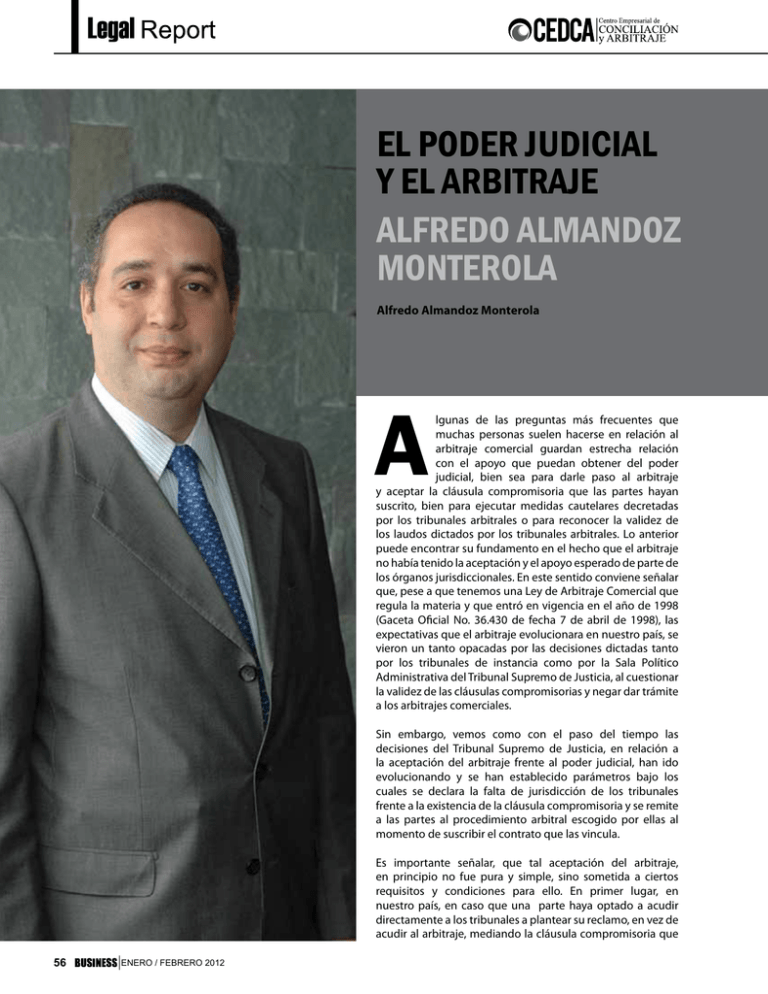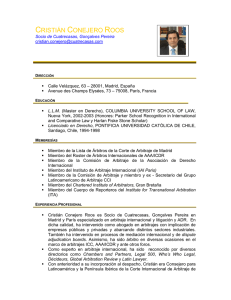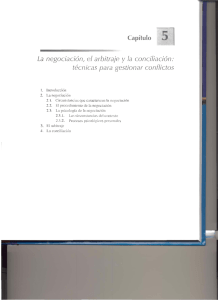el poder judicial y el arbitraje
Anuncio

EL PODER JUDICIAL Y EL ARBITRAJE ALFREDO ALMANDOZ MONTEROLA Alfredo Almandoz Monterola A lgunas de las preguntas más frecuentes que muchas personas suelen hacerse en relación al arbitraje comercial guardan estrecha relación con el apoyo que puedan obtener del poder judicial, bien sea para darle paso al arbitraje y aceptar la cláusula compromisoria que las partes hayan suscrito, bien para ejecutar medidas cautelares decretadas por los tribunales arbitrales o para reconocer la validez de los laudos dictados por los tribunales arbitrales. Lo anterior puede encontrar su fundamento en el hecho que el arbitraje no había tenido la aceptación y el apoyo esperado de parte de los órganos jurisdiccionales. En este sentido conviene señalar que, pese a que tenemos una Ley de Arbitraje Comercial que regula la materia y que entró en vigencia en el año de 1998 (Gaceta Oficial No. 36.430 de fecha 7 de abril de 1998), las expectativas que el arbitraje evolucionara en nuestro país, se vieron un tanto opacadas por las decisiones dictadas tanto por los tribunales de instancia como por la Sala Político Administrativa del Tribunal Supremo de Justicia, al cuestionar la validez de las cláusulas compromisorias y negar dar trámite a los arbitrajes comerciales. Sin embargo, vemos como con el paso del tiempo las decisiones del Tribunal Supremo de Justicia, en relación a la aceptación del arbitraje frente al poder judicial, han ido evolucionando y se han establecido parámetros bajo los cuales se declara la falta de jurisdicción de los tribunales frente a la existencia de la cláusula compromisoria y se remite a las partes al procedimiento arbitral escogido por ellas al momento de suscribir el contrato que las vincula. Es importante señalar, que tal aceptación del arbitraje, en principio no fue pura y simple, sino sometida a ciertos requisitos y condiciones para ello. En primer lugar, en nuestro país, en caso que una parte haya optado a acudir directamente a los tribunales a plantear su reclamo, en vez de acudir al arbitraje, mediando la cláusula compromisoria que 56 ENERO / FEBRERO 2012 así lo obligue, la otra parte debe manifestar expresamente mediante la oposición de una cuestión previa de inadmisibilidad, la falta de jurisdicción del juez venezolano frente al tribunal arbitral de acuerdo a lo establecido en la cláusula compromisoria que hayan suscrito las partes, ya que de no hacerlo en esta oportunidad ocurriría la renuncia tácita al acuerdo de arbitraje y el sometimiento a la jurisdicción ordinaria. De tal manera, que la oposición de la cuestión previa de falta de jurisdicción se convierte en condición esencial en nuestro país para que no ocurra la renuncia tácita o sumisión tácita a la jurisdicción. En segundo lugar, la Sala Político Administrativa del Tribunal Supremo de Justicia había establecido unos requisitos de obligatoria observancia de parte de los jueces para declarar la procedencia de la falta de jurisdicción habida cuenta de la existencia de la cláusula compromisoria. Entre estos requisitos se pueden mencionar, que era condición esencial para la Sala, como señalamos, que se opusiera la cuestión previa de falta de jurisdicción para que pueda ser declarada por el juez venezolano, en caso que una parte decida plantear su reclamo en sede judicial y no arbitral, lo que constituye, sin lugar a dudas la voluntad de las partes de someterse a arbitraje y la conducta procesal de ellas, en tanto, que manifiesten su expresa voluntad de acudir al procedimiento arbitral y no al judicial ordinario, y además se imponía como requisito al juez de instancia, el estudio de la validez de la cláusula compromisoria, cuando en todo caso, ello correspondería al tribunal arbitral en virtud del principio compétencecompétence (competencia de la competencia), quien debe revisar la validez de la cláusula compromisoria y la capacidad de las partes para someter la controversia a arbitraje. En todo caso, por mandato expreso de la Ley de Arbitraje Comercial venezolana, correspondería al Juez Superior venezolano, revisar estos elementos para determinar la validez o no del arbitraje y la capacidad de las partes para someter la controversia al procedimiento arbitral, y no al juez de instancia venezolano, de allí que para ese momento parecía desacertado que en un juicio ordinario se niegue la validez de la cláusula compromisoria o se cuestione la capacidad de las partes para someter la controversia a arbitraje, obligando a la parte que se opone al procedimiento judicial y manifiesta su voluntad expresa, ante el incumplimiento de la otra parte, de someter la controversia a arbitraje, a tener que tramitar todo un juicio ordinario con las dilaciones que ello supone. Tal criterio fue revisado por la Sala Constitucional del Tribunal Supremo de Justicia, en sentencia N° 1.067 publicada el 3 de noviembre de 2010, cuando entre otras cosas, se mencionó lo siguiente: “…En definitiva, sobre la base de las consideraciones expuestas respecto al principio de competencia-competencia y a las relaciones de coordinación y subsidiariedad de los órganos del Poder Judicial frente al sistema de arbitraje los órganos del Poder Judicial sólo pueden realizar un examen o verificación ‘prima facie’, formal, preliminar o sumaria de los requisitos de validez, eficacia y aplicabilidad de la cláusula arbitral, que debe limitarse a la constatación del carácter escrito del acuerdo de arbitraje y se excluye cualquier análisis relacionado con los vicios del S ome of the more frequent questions many persons usually have in regards to commercial arbitration are closely connected to the support they can obtain from the judiciary power, whether to continue on to arbitration and accept the commitment clause entered into by the parties or to execute precautionary measures decreed by the arbitration courts or to recognize the validity of the awards issued by the arbitration courts. The foregoing may be based on the fact that arbitration has not received the expected acceptance and support of the jurisdictional state entities. In this regard, it is worthwhile pointing out that although there is a law on commercial arbitration which regulates this subject matter and which was enacted in 1998 (in official gazette No. 36430 dated April 7, 1998), the expectations that the act of arbitration would evolve in our nation have been somewhat clouded by decisions issued by the regular courts as well as the political administrative court of the supreme court of justice, which have all questioned the validity of the commitment clauses and have refused to process commercial arbitration actions. Nevertheless, we have seen as time goes by that the decisions made by the supreme court of justice in regards to the acceptance of arbitration actions vis-à-vis the judiciary power have evolved, and parameters have been set to declare the lack of jurisdiction of the courts when there is a commitment clause; the parties are then remitted to arbitration proceedings as selected by them in the signed binding contract. It is important to point out that the acceptance of this arbitration was in principle not pure and simple, but was subject to certain requirements and conditions. In the first place, in our nation if one party opted for going straight to the courts to pose their claim instead of using arbitration, even when the commitment clause obligates them, the other party must expressly state -by opposing a prior inadmissible claim- the lack of jurisdiction of the Venezuelan judges and acceptance of the arbitration court, as per the provisions in the commitment clause entered into by the parties, since non-compliance of this would imply the tacit waiver of the arbitration agreement and submittal to the regular jurisdiction channels. In this manner, the opposition of the prior inadmissible claim due to the lack of jurisdiction becomes an essential condition in our country for neither a tacit waiver not to occur nor the tacit submission to the regular jurisdiction channels. In the second place, the political administrative court of the supreme court of justice has established compulsory requirements so that the judges can declare the legality of the lack of jurisdiction when a commitment clause exists. Among these requirements, we can mention as a compulsory condition that the prior inadmissible claim of lack of jurisdiction be opposed so that it can be declared by the Venezuelan judge, in the event that one party ENERO / FEBRERO 2012 57 consentimiento que se deriven de la cláusula por escrito…”. Lo anterior, significó un gran apoyo a la institución del arbitraje en nuestro país, pues se reconoce que el juez venezolano sólo debe constatar el carácter escrito del acuerdo de arbitraje, sin entrar en ningún tipo de análisis en relación a la capacidad de las partes o vicios del consentimiento manifestado por ellas al momento de celebrar el contrato y suscribir la cláusula compromisoria, ya que en todo caso, ello corresponderá única y exclusivamente a los árbitros que las partes designen para decidir el arbitraje. Cabe destacar que este criterio es vinculante para todos los Tribunales de la República. De tal manera, que vemos como desde la publicación del fallo en referencia, tanto los tribunales de instancia como la propia Sala Político Administrativa del Tribunal Supremo de Justicia, han dado estricto cumplimiento a las bases sentadas por la Sala Constitucional del Tribunal Supremo de Justicia en cuanto al arbitraje se refiere, y entre otras podemos mencionar que la Sala Político Administrativa, en sentencia Nº 00974 publicada el 20 de julio del 2011, ha sostenido lo siguiente: “…De la jurisprudencia antes transcrita se desprende que el análisis que hagan los jueces sobre las cláusulas contentivas de acuerdos arbitrales, no puede desconocer la participación necesaria de los órganos del Poder Judicial para resolver un conflicto, pero tampoco puede afectar al arbitraje como un medio idóneo y eficaz para solucionar una controversia. Por otra parte, conforme a dicho criterio jurisprudencial esta Sala Político-Administrativa ha asumido el criterio de acuerdo al cual “…el examen que realice el Poder Judicial a los efectos de determinar la validez, eficacia y aplicabilidad de las cláusulas arbitrales, debe limitarse a la constatación de la existencia por escrito del acuerdo de arbitraje sin analizar la configuración de los vicios del consentimiento que puedan afectar a dicho acuerdo.” De la evolución de los criterios a los que hemos hecho referencia por parte de nuestro máximo Tribunal de Justicia, podemos concluir que en lo que respecta al arbitraje comercial, parecieran despejarse las dudas de contar con el apoyo de los tribunales de nuestro país, para los temas a los cuales hicimos mención al inicio, como serían: darle paso al arbitraje y aceptar la cláusula compromisoria que las partes hayan suscrito, ejecutar medidas cautelares decretadas por los tribunales arbitrales o reconocer la validez de los laudos dictados por los tribunales arbitrales. 58 ENERO / FEBRERO 2012 decides to pose their claim in a judiciary court and not an arbitration court, which undoubtedly constitutes the will of the parties to submit to arbitration and the procedural conduct thereof, since they have stated their express will to resort to the arbitration procedure and not to the ordinary channels. The other requirement imposed on the court judge was to study the validity of the commitment clause when, in any event, this would correspond to the arbitration court by virtue of the principle of compétence-compétence. Said court must revise the validity of the commitment clause and the parties´ capacity to submit the controversy to arbitration. In any event, as per the express mandate of the Venezuelan law on commercial arbitration, the Venezuelan senior judge would have to review these elements in order to determine the validity or not of arbitration proceedings and the parties´ capacity to submit the controversy to an arbitration procedure - and not the Venezuelan trial judge. Therein that at this moment, it seemed to be wrong that a regular trial could deny the validity of the commitment clause or that it could question the capacity of the parties to submit the controversy to arbitration, forcing the party that opposed the legal proceedings and which has stated his express will –since they face non-compliance by the other party- to submit the controversy to arbitration, and have to go through the process of an entire trial and all the dilations involved therein. This criterion was revised by the constitutional court of the supreme court of justice, and sentence N° 1067 was published on November 3, 2011, mentioning among other things the following: “…In short, on the basis of the considerations expounded with respect to the principle of competence-competence and the relations of coordination and subsidiarity of the organs of the judicial power vis-à-vis the arbitration system, the organs of the judicial power can only conduct a ‘prima facie’, formal, preliminary or summary exam or check of the requirements of validity, efficacy and applicability of the arbitration clause, which must be limited to confirmation of the written nature of the arbitration agreement and excludes any analysis related to the defects in the consent derived from the clause in writing…”. The foregoing implied a major support to the institution of arbitration in our country, since it recognizes that the Venezuelan judges can only verify that the arbitration agreement is in writing without entering into any type of analysis with respect to the parties´ capacities or consent defects stated by them when entering into the contract and signing the commitment clause since, in any event, this would correspond solely and exclusively to the arbiters designated by the parties to decide on the arbitration. It is worthwhile mentioning that this criterion is binding for all the courts of the republic. In this manner, we can see how, since the publication of the decision referenced, the instance courts as well as the political administrative court of the supreme court of justice have strictly complied with the foundation set by the constitutional court of the supreme court of justice regarding arbitration, and among others issues we can mention political administrative court ruling Nº 00974, published on July 20, 2011, which states the following: “…from the previously transcribed jurisprudence it can be inferred that the analysis conducted by the judges on clauses which contain arbitration agreements cannot disregard the necessary participation of the organs of the judicial power to solve a conflict, but neither can it dismiss arbitration as an ideal and efficient means to solve a controversy. On the other hand, as per said jurisprudence criterion, this political-administrative court has adopted the criterion based on which “…the examination made by the judicial power for the purposes of determining the validity, efficacy and applicability of the arbitration clauses must be limited to verifying the existence in writing of the arbitration agreement, without analyzing the configuration of any defects of consent which could affect said agreement.” Based on the evolution of the criteria of our maximum court of justice which we have made reference to, we can conclude that with respect to commercial arbitration the doubts seem to have been dispelled and we can count on the support of our nation´s courts on the subject matters mentioned initially, such as allowing for arbitration and accepting any commitment clause that the parties have entered into, executing precautionary measures decreed by arbitration courts and recognizing the validity of the awards issued by the arbitration courts. CEDCA 2da. Avenida de Campo Alegre, Torre Credival Piso 6. Caracas Teléfono / Phone: 263.08.33, Ext.: 220 - 221 - 152 www.cedca.org.ve [email protected] @CEDCAorg ENERO / FEBRERO 2012 59


